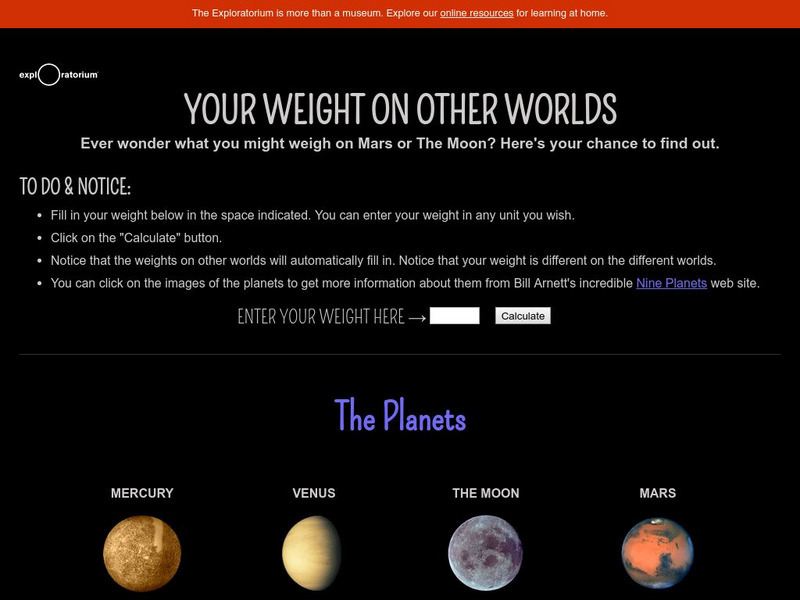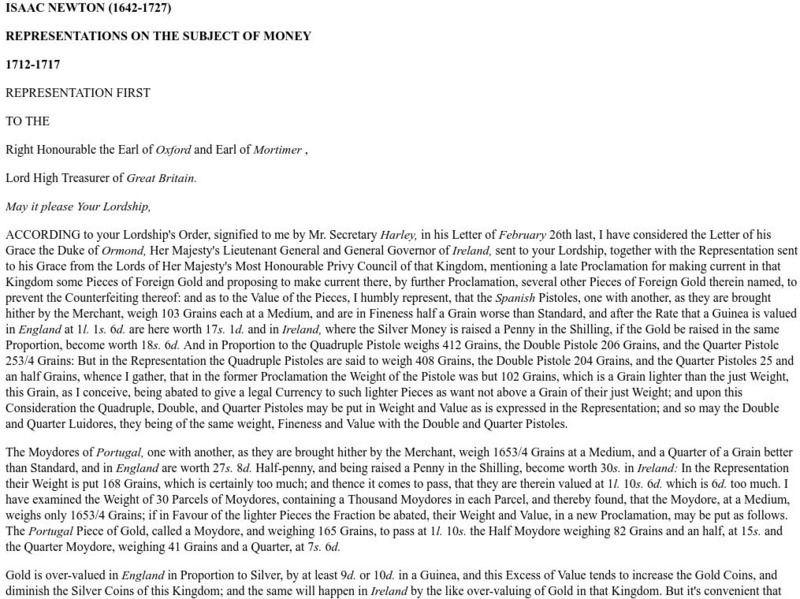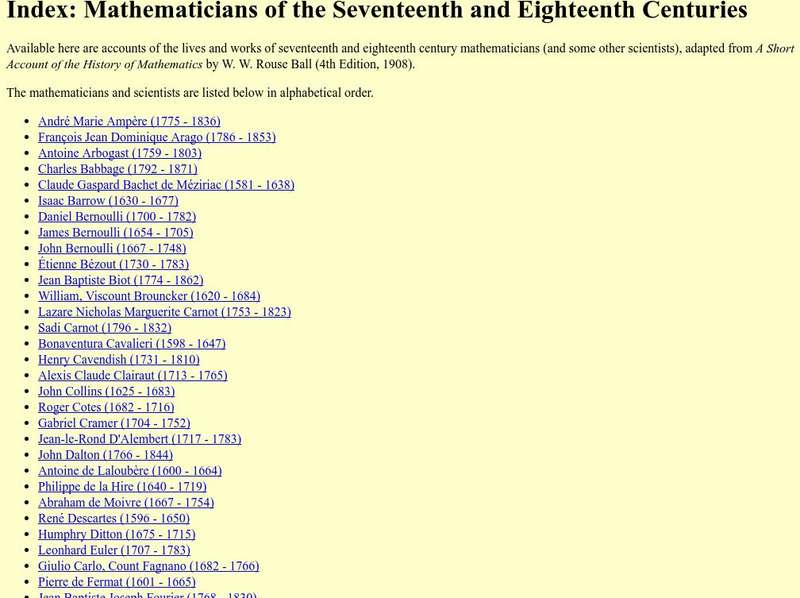Physics Classroom
The Physics Classroom: Inertia and Mass
This is part of a lesson on Newton's Laws of Motion that focuses on inertia and mass. It restates Newton's first law of motion. The lesson also gives a helpful visual description concerning friction.
Physics Classroom
The Physics Classroom: The Apple, the Moon, and the Inverse Square Law
Describes the logic behind the development of Newton's law of universal gravitation. Beginning with Johannes Kepler and his three laws of planetary motion, content walks the reader through Newton's thought process and development of this...
Exploratorium
Exploratorium: Your Weight on Other Worlds
From the Exploratorium Museum. Includes an interactive feature in which a visitor enters their weight on earth and has their weight on other planets computed and displayed. Discusses the distinction between mass and weight and describes...
McMaster University
Mc Master Univ: Representations on the Subject of Money
This site from the McMaster University provides the full text article of Newton's work, "Representations on the Subject of Money." Newton wrote these letters while serving as head of minting operations.
Curated OER
Science World: Life of Sir Isaac Newton
This site from ScienceWorld provides an interesting biographical sketch of the English physicist and mathematician, Isaac Newton. The biography is a good size in length and very informative, with links provided throughout for additional...
Curated OER
Science Kids: Science Images: Isaac Newton
This image is of Isaac Newton, one of the most famous scientists of all time. Check out our Isaac Newton facts page for more information.
Curated OER
Etc: Clip Art Etc: Death Mask of Sir Isaac Newton
The death mask of Sir Isaac Newton, who discovered the law of gravitation.
Curated OER
Smithsonian Libraries: Scientific Identity: Isaac Newton (1642 1727)
A portrait of Isaac Newton from the Dibner Library of the History of Science and Technology, made available through the Smithsonian Institution's Scientific Identity Collection.
Curated OER
Smithsonian Libraries: Scientific Identity: Isaac Newton (1642 1727)
A portrait of Isaac Newton from the Dibner Library of the History of Science and Technology, made available through the Smithsonian Institution's Scientific Identity Collection.
Curated OER
Smithsonian Libraries: Scientific Identity: Isaac Newton (1642 1727)
A portrait of Isaac Newton from the Dibner Library of the History of Science and Technology, made available through the Smithsonian Institution's Scientific Identity Collection.
Curated OER
Smithsonian Libraries: Scientific Identity: Isaac Newton (1642 1727)
A portrait of Isaac Newton from the Dibner Library of the History of Science and Technology, made available through the Smithsonian Institution's Scientific Identity Collection.
Curated OER
Smithsonian Libraries: Scientific Identity: Isaac Newton (1642 1727)
A portrait of Isaac Newton from the Dibner Library of the History of Science and Technology, made available through the Smithsonian Institution's Scientific Identity Collection.
Curated OER
Smithsonian Libraries: Scientific Identity: Isaac Newton (1642 1727)
A portrait of Isaac Newton from the Dibner Library of the History of Science and Technology, made available through the Smithsonian Institution's Scientific Identity Collection.
TED Talks
Ted: Ted Ed: Free Falling in Outer Space
With a little help from Sir Isaac Newton, Matt J. Carlson explains the basic forces acting on an astronaut during a free fall. [2:59]
TeachEngineering
Teach Engineering: May the Force Be With You: Thrust
In this lesson, students will study how propellers and jet turbines generate thrust. This lesson focuses on Isaac Newton's 3rd Law of Motion, which states that for every action there is an equal and opposite reaction.
University of Maryland
Optics Highlights: The Telescope
Part of an anecdotal history of optics and the study of light. Extremely thorough treatment of the invention of the telescope. Includes a short biographical sketch and discusses the work of Isaac Newton which focuses on his contribution...
Physics Classroom
The Physics Classroom: Circular and Satellite Motion: The Inverse Square Law
Through illustrated examples and interactive practice, students explore Newton's ability to relate the cause for heavenly motion (the orbit of the moon about the earth) to the cause for Earthly motion (the falling of an apple to the...
Trinity College Dublin
Mathematicians of the Seventeenth & Eighteenth Centuries
Read accounts of the lives and works of seventeenth and eighteenth century mathematicians, including Sir Isaac Newton and Rene Descartes.
TED Talks
Ted: Ted Ed: Football Physics: The "Impossible" Free Kick
Learn about the Magnus Effect, a phenomenon discovered by Isaac Newton. Brazilian football player Roberto Carlos used it to score a seemingly impossible goal in a game of football in 1997. Includes a video, multiple-choice and open-ended...
Curated OER
Web Gallery of Art: Sir Isaac Newton
An image of "Sir Isaac Newton", created by Sir James Thornhill from 1709-12 (Oil on canvas).
Other popular searches
- Isaac Newton
- Sir Isaac Newton
- Isaac Newton Power Point
- Isaac Newton 2nd Law
- Isaac Newton and Gravity
- Isaac Newton Gravity
- Education of Isaac Newton
- Isaac Newton Research
- Isaac Newton Vocabulary
- Pics of Isaac Newton
- Pods of Isaac Newton
- Sir Isaac Newton Apples








